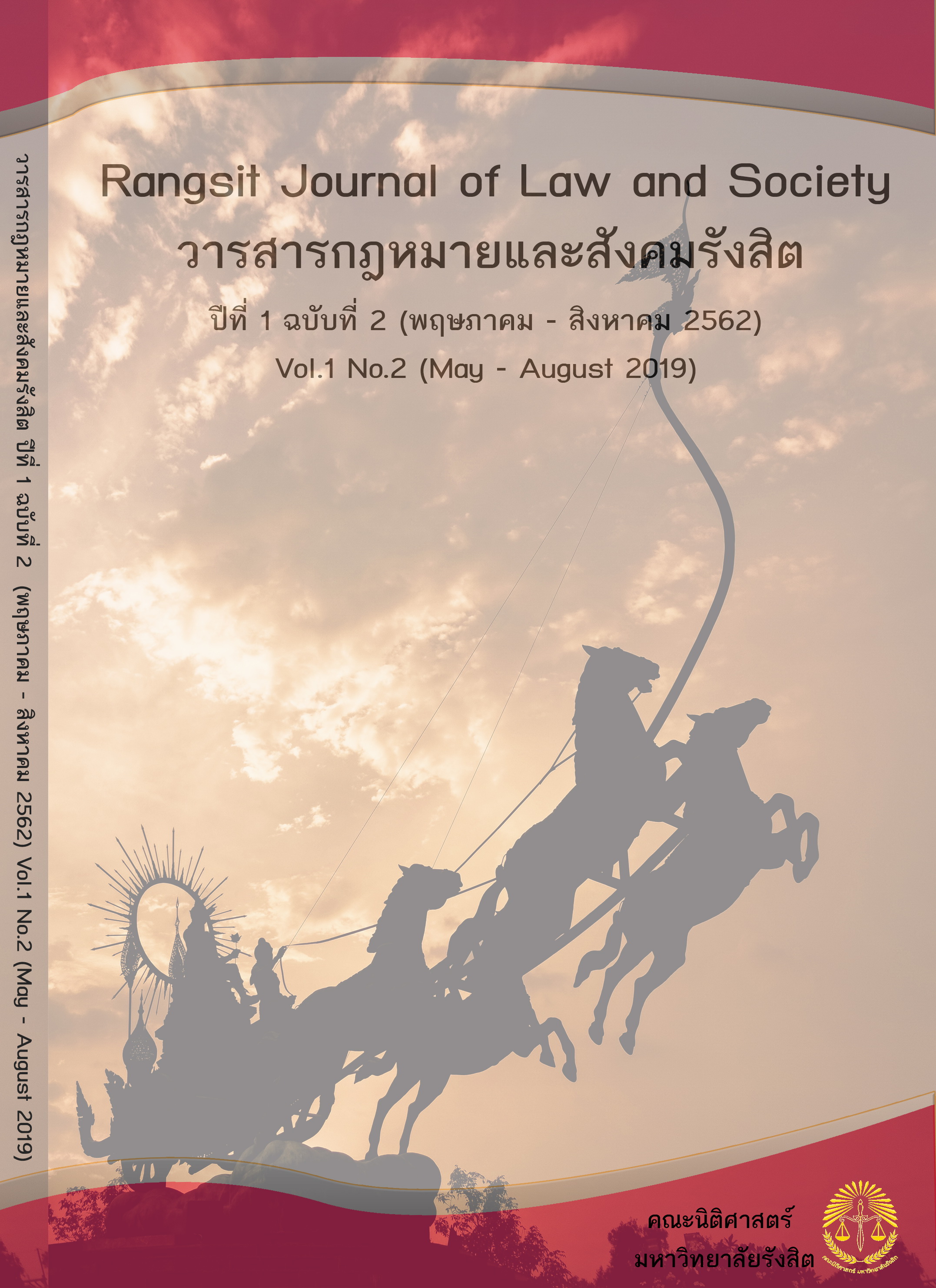ระบบบรรษัทภิบาลของฝรั่งเศส: ทางเลือกของบรรษัทภิบาลในประเทศไทย
Main Article Content
บทคัดย่อ
ในการนำเอาระบบบรรษัทภิบาลของฝรั่งเศสมาใช้ในประเทศไทยเป็นหัวข้อที่น่าสนใจเพราะไทยและฝรั่งเศสใช้ระบบประมวลกฎหมายเหมือนกัน อย่างไรก็ตามการนำระบบบรรษัทภิบาลของอังกฤษที่ใช้อยู่ในปัจจุบันมีปัญหาเพราะระบบกฎหมายที่แตกต่างกันระหว่างไทยและอังกฤษ นอกจากนี้กฎธรรมาภิบาลของอังกฤษออกแบบมาเพื่อใช้กับการกระจายความเป็นเจ้าของในตลาดหุ้นที่มีกลไกการกำกับที่ดีจึงไม่ให้ความสำคัญกับเรื่องธุรกิจครอบครัว การกระจุกตัวความเป็นเจ้าของ การเป็นกรรมการข้ามบริษัทกัน การถือหุ้นข้ามบริษัทกัน พันธมิตรแบบไม่เป็นทางการและรัฐวิสาหกิจ ไทยใช้ระบบประมวลกฎหมายแต่อังกฤษใช้ระบบกฎหมายประเพณี ดังนั้นบทความนี้จึงสำรวจประเด็นนี้ผ่านการทบทวนวรรณกรรมของระบบบรรษัทภิบาลของฝรั่งเศส เช่น กฎหมายบรรษัท การประสานความเป็นเจ้าของและการประสานงานระหว่างบริษัท และพบว่าตลาดหุ้นของไทยและฝรั่งเศสจะมีการการกระจุกตัวความเป็นเจ้าของโดยธุรกิจครอบครัวและรัฐวิสาหกิจ เนื่องจากไทยและฝรั่งเศสใช้ระบบกฎหมายเดียวกันและมีสภาพแวดล้อมทางธุรกิจคล้ายคลึงกันดังนั้นบทความนี้จึงเสนอว่าไทยควรจะปฏิรูปกฎหมายเกี่ยวกับบรรษัทภิบาลตามแนวทางของฝรั่งเศส ซึ่งไทยควรรวบรวมกฎหมายเกี่ยวกับบรรษัทภิบาลและหน่วยงานบังคับใช้กฎหมายที่กระจัดกระจายอยู่เข้าด้วยกันเพื่อเพิ่มประสิทธิภาพในการบังคับใช้และปฏิบัติตามกฎหมาย ทำได้โดยแยกประมวลกฎหมายแพ่งและพาณิชย์ออกเป็นประมวลกฎหมายแพ่งและประมวลกฎหมายพาณิชย์ และนำประมวลกฎหมายพาณิชย์นี้ไปรวมกับกฎหมายอื่นๆที่เกี่ยวข้อง และไทยควรรวมกฎหมายที่เกี่ยวกับการเงินการธนาคารทั้งหมดมารวมเป็นประมวลกฎหมายการเงินการธนาคาร ก่อนที่จะนำกฎบรรษัทภิบาลไปผูกกับประมวลกฎหมายทั้งหลายเหล่านี้
Article Details

อนุญาตภายใต้เงื่อนไข Creative Commons Attribution-NonCommercial-NoDerivatives 4.0 International License.
เอกสารอ้างอิง
Amable, B. The diversity of modern capitalism. Oxford: Oxford, 2003.
Aste, L.G. "Reforming French corporate governance: A return to the tow-tier board." The George Washington Journal of International Law and Economic, 1999: 32(1), 1-72.
Balachandran, K. R., Rossi, A. & Van der Stede, W. A. "Corporate governance research in 'The rest of the world." Journal of Accounting, Auditing & Finance, 2011: 26(3), 523-529.
Gomez, P.Y. “On the discretionary power of the top executives: Evolution of the theoretical foundations.” International Studies of Management and Organisation, 2004: 34(2), 37-62.
Hancké, B. "Revisiting in the French model: Coordination and restructuring in French industry." In Varieties of capitalism: The institutional foundation of comparative advantages, by Hall P. A.& Soskice D., 307-344. Oxford: Oxford, 2001.
Krishnamurti, C. S., Sěvić, A. & Sěvić, Z. "Legal environment, firm-level corporate governance and expropriation of minority shareholders in Asia." Economic Change and Restructuring, 2005: 38, 85-111.
Maclean, M., Harvey, C. & Chia, R. “Dominant corporate agents and power elite in France and Britain.” Organisation Studies, 2010: 31(3), 327-348.
Millet-Reyes, B. & Zhao, R. “A comparison between one-tier and two-tier board structure in France.” Journal of International Financial Management and Accounting, 2010: 21(3), 279-310.
Morin, F. “A transformation in the French model of shareholding and management.” Economy and Society, 2000: 29(1), 36-53.
Morin, F. “A transformation in the French model of shareholding and management.” Economy and Society, 2000: 29(1), 36-53.
Murphy, A. "Corporate ownership in France: The importance of history." In A history of corporate governance around the world: Family business groups to professional managers, by Morck R.K., 185-222. Washington : NBER, 2005.
Nowland, J. "Are East Asian companies benefiting from Western practices." Journal of Business Ethics, 2008: 79, 133-150.
Peng, M.W., Au, K.Y. & Wang, D.Y.L. "Interlocking directorates as corporate governance in Third world multinational : Theory and evidence from Thailand." Asia Pacific Journal of Management, 2001: 18, 161-181.
Segrestin, B. & Hatchuel, A. “Beyond agency theory: A post crisis view of corporate law.” British Journal of Management, 2011: 22(3), 484-497.
Yoo, T. & Lee, S.H. “In search of social capital in state activist capitalisms: Elite networks in France and Korea.” Organisation Studies, 2009: 30(5), 529-547.

